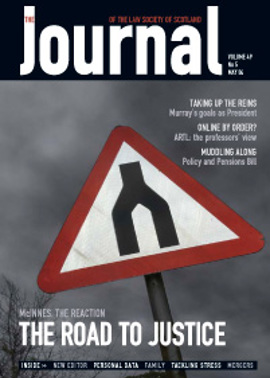Justice and independence
“A strong and independent legal profession is an essential part of the lifeblood of a democracy.” How many times have such quotes been used by lawyers when trying to protect their clients’, or indeed their own interests? It is seldom subjected to rigorous examination. But let us for a moment think the unthinkable and ask if the legal profession in Scotland does need to be “independent” in the sense of remaining principally in the private sector in order to do its job properly.
The medical profession in the UK was nationalised over 50 years ago. Have doctors given up their professionalism? Has their standard of living been eroded? Are they cowed by having the status of employees? In the main, nationalisation has served the public, and the doctors, well. Should we think along the same lines for lawyers?
A number of seemingly disparate factors come together when considering this question. First, one in four Scottish solicitors is employed other than in private practice. This drift from the private to the public sector is expected to continue.
Secondly, although we are loth to admit it, some solicitors are not doing at all well financially. Threadbare fees for conveyancing and legal aid mean that many small practices’ accountants are heard to wonder why some lawyers bother at all. Such practices provide a service better delivered in the public sector.
Thirdly, lawyers already take money from the public purse in the shape of legal aid. The Scottish Executive is expanding the Public Defenders system. The UK Government, in implementing “Clementi” reforms, is expected to allow solicitors who are employees to give legal advice to private clients. (For some reason, everyone seems to envisage that this will happen at Tesco’s!) So public investment in the direct delivery of legal services is already increasing.
Fourthly, the debate as to whether or not the Law Society of Scotland can properly fulfil the dual role of regulator in the public interest and “trade union” for solicitors will simply never go away. The medical profession has the BMA to represent doctors and the statutory GMC to regulate not only the practising profession but also the teaching hospitals and universities – the last being something the Law Society does not do in any meaningful way. An independent regulator would inevitably come with any nationalisation scheme. England is about to have one; can Scotland be different?
Fifthly, the larger Scottish legal practices have moved from the practice of law as previously understood to the point where they make much of their money from work which does not require them to be admitted Scottish solicitors. There would be no question of such firms being involved in any nationalisation scheme. They would not want to be, and need not be involved.
These factors make it right to consider carefully if there is no alternative to a private profession continually fighting a rearguard action when privileges and monopolies are attacked. A public sector legal profession would arguably be more powerful, the delivery of legal services being seen as the state’s responsibility.
It is in the public interest that there should be a strong legal profession. It must have a degree of independence. But that does not require that we organise the delivery of our services primarily from private legal practices. Independence can be achieved by applying professional standards and practices as easily in the employee situation as in the employer. Judges have maintained theirs for centuries.
Space does not allow exploration of the mechanics. Any such scheme would not have to be compulsory. As with the medical profession, it would be possible for lawyers to sell their services privately as well as taking a salary from (in effect) the state. There are many possible objections to the idea. Some might say the medical profession is not a model because doctors do not have commercial clients. Also the GMC is not always acclaimed by the public as independent. If nationalisation took place, the Government would, as always, endeavour to spend as little as possible on the process. Many lawyers might wish to continue to paddle their own canoe, if administrative independence is attractive to them.
The arguments could go on endlessly. But can I end by stating what I have stated to Diploma students in class for many years. Fairness/justice is a fundamental feature of the human condition. But, in Scotland, like many other countries, the legal profession and the legal system have signally failed to afford justice for all. For 98% of the population, 98% of the law might as well not exist. That is because they cannot afford the time and money involved in the Scottish legal process. If we continue to insist on arranging our affairs as at present, that fundamental and glaring injustice will never change. Is an alternative not at least worthy of some thought?
In this issue
- Thank you to a great team
- Justice and independence
- Take the low road
- Pensions crisis, what crisis?
- Whale... or rabbit?
- Blissful union?
- Cracking up
- The big 3
- Personal attention
- Looking forward to retirement?
- Grasping the issues
- Credit balance
- No warrant for refusal
- Holding our breath
- Scottish Solicitors' Discipline Tribunal
- Personality rights: a brand new species?
- Beware of Companies House disclaimers
- Website reviews
- Book reviews
- The new law of real burdens
- Deductions of title
- Waste paper?






